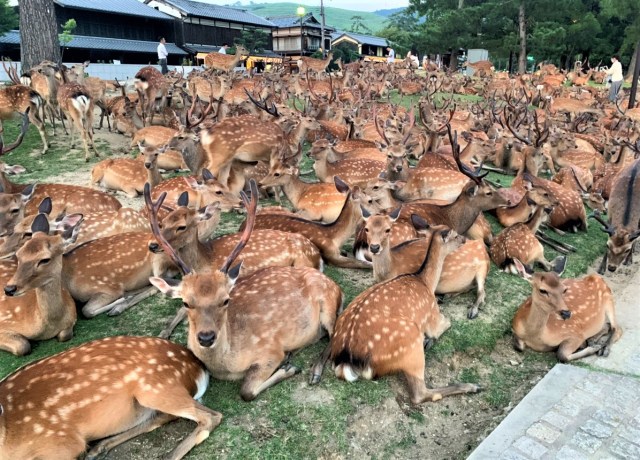
Why do hundreds of deer sit together for an hour at this spot in Nara Park every evening in summer? Our reporter investigates.
If you’ve ever visited the city of Nara in Kyoto’s neighbouring Nara Prefecture, you’ve probably walked amongst the area’s large population of free-roaming deer, and maybe even run away from some of them as they nosed their way through all your belongings in an attempt to get at those tasty rice crackers.
If you visit during summer though, you’ll find them less rambunctious during the evening hours as the sun descends over the city. That’s when a special phenomenon is known to occur, and it’s called “shikadamari“.
Shikadamari, which loosely translates to “deer gathering spot”, is the unofficial term that’s been coined for the phenomenon, and this is what it looks like on a typical day in summer.
Our Nara-based reporter, Masami, has seen this phenomenon occur every summer, but this year, after it was reported that the number of deer gathering was higher than usual, she decided to head down to the location to see exactly what was happening.
▼ To understand the deer, one must become the deer.
Sure enough, at around 6:30 p.m. in the evening, deer had come from around Nara Park to settle on this particular location, opposite the Nara National Museum, which is located in a corner of the park.
While it’s not unusual to see a few deer relaxing together in Nara Park, it is unusual to see them gathering in one spot in large numbers. What’s most baffling about the occurrence is the fact that they come together to sit at the same spot at the same time each day, and for the same amount of time as well.
The deer gathering begins at around 6:30 p.m. and reaches its peak just before 7:00 p.m. The deer sit quietly together, and then, after 7:00 p.m., they stand up and go back to different areas of the park.
This behavioural pattern occurs day after day in summer, lasting for about an hour every evening. When Masami visited, she did a head count of the deer and counted a whopping 623 animals at the gathering spot.
According to a 2019 survey by the Nara Deer Preservation Foundation, Nara Park is currently home to 1,388 deer. That means roughly half of the park’s deer come together each evening to participate in this mysterious gathering, which is a large chunk of the total population. So what on earth could they be doing?
▼ Are they waiting for a summer music festival to start?
▼ “Hey, Jiro – sit down! I wanna see the band when they come on!”
▼ “I keep telling you – Summer Sonic is in Osaka, not Nara. We keep coming here every night but it’s never gonna happen.”
One of the most plausible explanations for this phenomenon is that the deer come to this particular spot to cool down. After all, there appears to be a large vent in the vicinity, which may provide the animals with some cool air.
However, wouldn’t it be cooler to be away from the body heat of other animals, rather than in close proximity to them? And with the freedom to roam anywhere they like, why don’t they dip their feet in the water like this deer instead?
It’s hard to know whether this really is the coolest spot in the park after sundown, given that the area in front of the museum is in full sun throughout the day, keeping the earth warm well into the evening.
Perhaps this mix of warm earth and cool air is irresistible to deer? And somehow one in every two deer in the park knows that the prime time for these perfect conditions is only between 6:30 and 7:30 on a summer’s evening?
We enquired with the Nara Deer Preservation Foundation to see if they could give us an explanation for the shikadamari phenomenon, and they had this to say:
“We understand that the deer gather in front of the Nara National Museum, however no survey has been conducted into the number of deer that gather there. We also do not know the reason why they gather there. Sorry we cannot be of any assistance.”
With that reply from the association that looks after the deer in the park, the shikadamari phenomenon remains an official mystery. Why do you think the deer gather at the same spot every day during summer? Let us know your thoughts in the comments section below!
Photos © SoraNews24
● Want to hear about SoraNews24’s latest articles as soon as they’re published? Follow us on Facebook and Twitter!
[ Read in Japanese ]

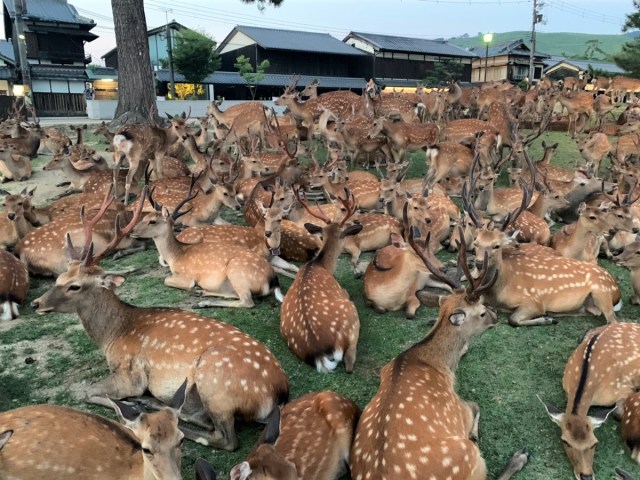
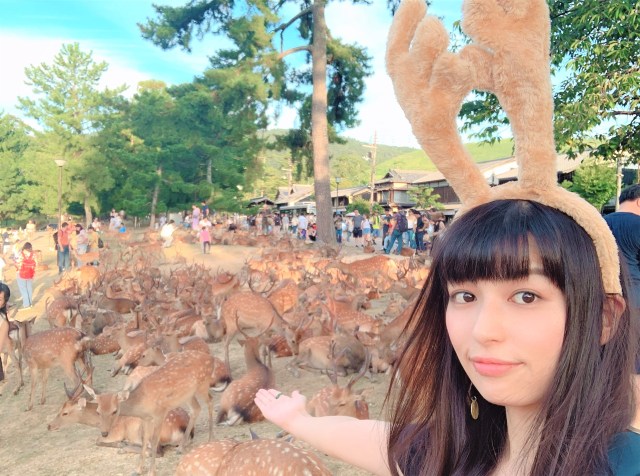
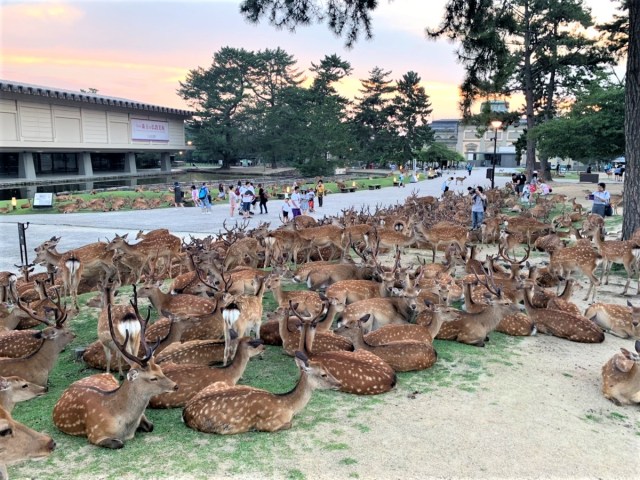
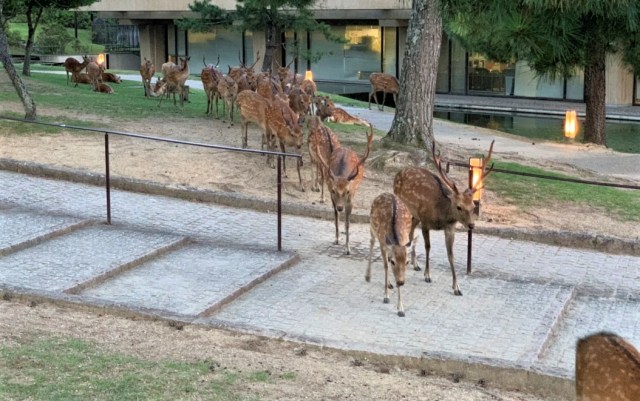
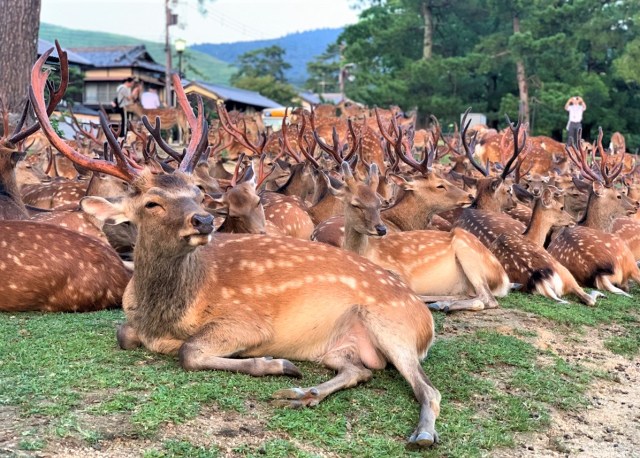
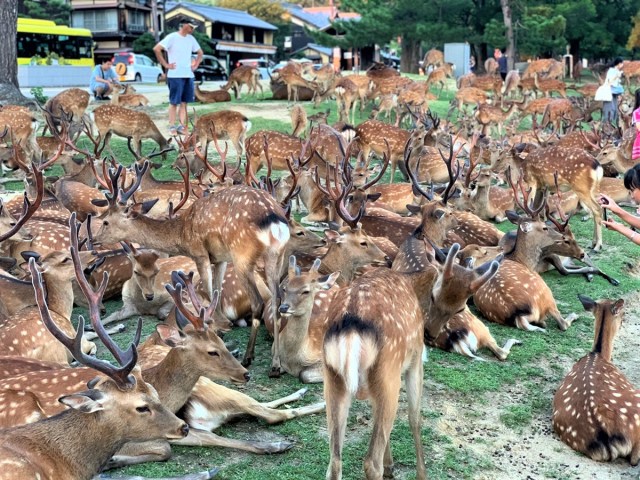
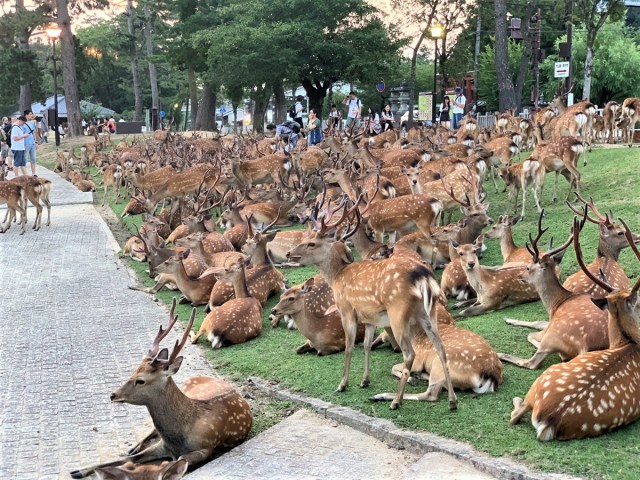
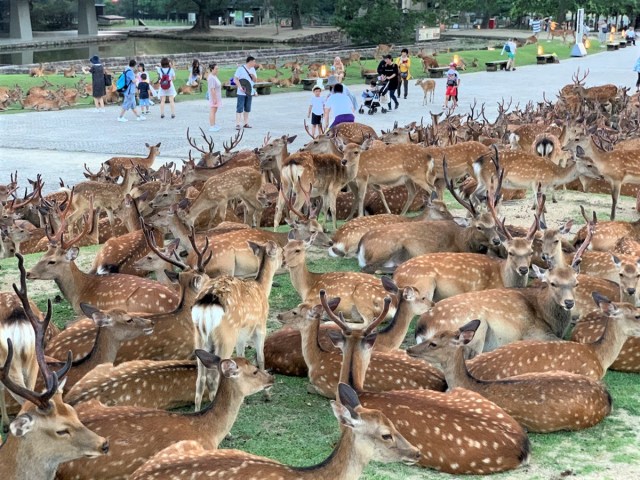
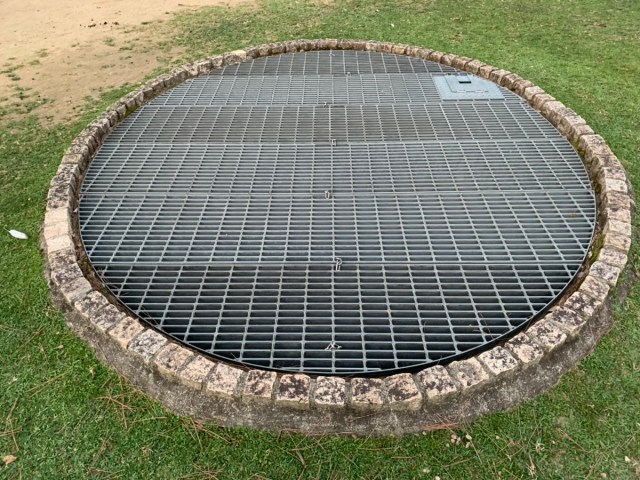
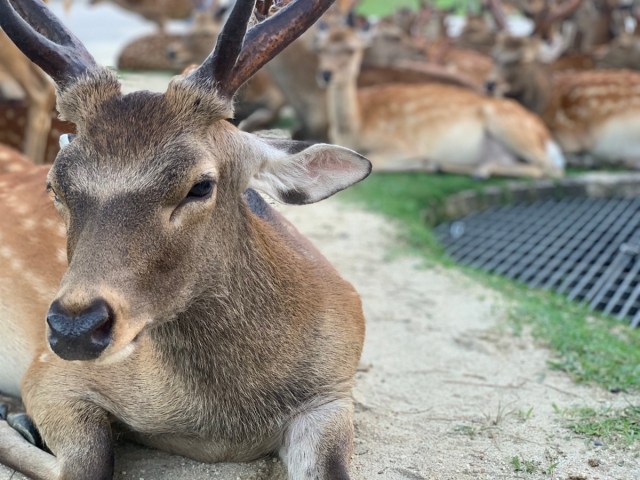
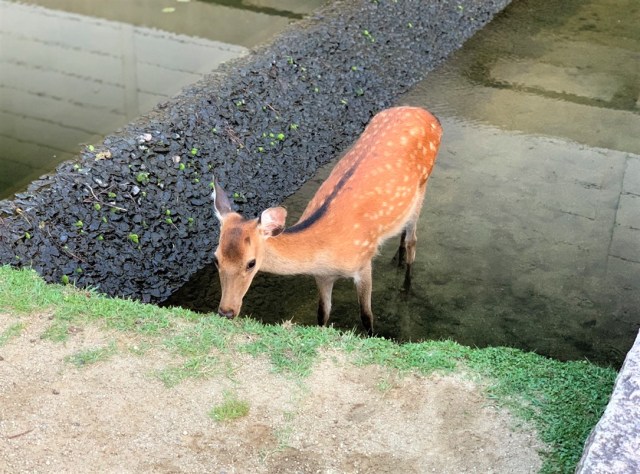

 Deer in Nara Park outnumber visitors, display baffling summer gathering behaviour
Deer in Nara Park outnumber visitors, display baffling summer gathering behaviour Deer in Nara Park mysteriously disappear during this year’s shikadamari season
Deer in Nara Park mysteriously disappear during this year’s shikadamari season Bizarre “shikadamari” deer gathering at Nara Park baffles people in Japan
Bizarre “shikadamari” deer gathering at Nara Park baffles people in Japan Nara deer shikadamari phenomenon continues to baffle visitors at Nara park
Nara deer shikadamari phenomenon continues to baffle visitors at Nara park Nara deer shikadamari mystery deepens as tourists return to Nara park
Nara deer shikadamari mystery deepens as tourists return to Nara park Yakuzen ramen restaurant in Tokyo is very different to a yakuza ramen restaurant
Yakuzen ramen restaurant in Tokyo is very different to a yakuza ramen restaurant Tokyo Skytree turns pink for the cherry blossom season
Tokyo Skytree turns pink for the cherry blossom season Here are the top ten foodie factory tours for the fall throughout Japan
Here are the top ten foodie factory tours for the fall throughout Japan Is Sapporio’s Snow Festival awesome enough to be worth visiting even if you hate the snow? [Pics]
Is Sapporio’s Snow Festival awesome enough to be worth visiting even if you hate the snow? [Pics] Miss World Japan: The great-times-20-granddaughter of samurai lord One-Eyed Dragon
Miss World Japan: The great-times-20-granddaughter of samurai lord One-Eyed Dragon Japan’s first-ever capybara cat cafe opens in Tokyo
Japan’s first-ever capybara cat cafe opens in Tokyo The 10 best day trips from downtown Tokyo【Survey】
The 10 best day trips from downtown Tokyo【Survey】 A look back on 40 years of Japanese schools banning stuff
A look back on 40 years of Japanese schools banning stuff We order lunch at Mos Burger-owned restaurant, end up with traditional Japanese breakfast
We order lunch at Mos Burger-owned restaurant, end up with traditional Japanese breakfast What’s inside Starbucks Japan’s fukubukuro lucky bag for 2026?
What’s inside Starbucks Japan’s fukubukuro lucky bag for 2026? The 10 most annoying things foreign tourists do on Japanese trains, according to locals
The 10 most annoying things foreign tourists do on Japanese trains, according to locals Starbucks Japan releases new sakura goods and drinkware for cherry blossom season 2026
Starbucks Japan releases new sakura goods and drinkware for cherry blossom season 2026 Naruto and Converse team up for new line of shinobi sneakers[Photos]
Naruto and Converse team up for new line of shinobi sneakers[Photos] Japan has trams that say “sorry” while they ride around town…but why?
Japan has trams that say “sorry” while they ride around town…but why? Sakura Totoro is here to get spring started early with adorable pouches and plushies
Sakura Totoro is here to get spring started early with adorable pouches and plushies Starbucks Japan unveils new sakura Frappuccino for cherry blossom season 2026
Starbucks Japan unveils new sakura Frappuccino for cherry blossom season 2026 Poop is in full bloom at the Unko Museums for cherry blossom season
Poop is in full bloom at the Unko Museums for cherry blossom season Now is the time to visit one of Tokyo’s best off-the-beaten-path plum blossom gardens
Now is the time to visit one of Tokyo’s best off-the-beaten-path plum blossom gardens Playing Switch 2 games with just one hand is possible thanks to Japanese peripheral maker
Playing Switch 2 games with just one hand is possible thanks to Japanese peripheral maker Japan’s newest Shinkansen has no seats…or passengers [Video]
Japan’s newest Shinkansen has no seats…or passengers [Video] Foreigners accounting for over 80 percent of off-course skiers needing rescue in Japan’s Hokkaido
Foreigners accounting for over 80 percent of off-course skiers needing rescue in Japan’s Hokkaido Super-salty pizza sends six kids to the hospital in Japan, linguistics blamed
Super-salty pizza sends six kids to the hospital in Japan, linguistics blamed Foreign tourists in Japan will get free Shinkansen tickets to promote regional tourism
Foreign tourists in Japan will get free Shinkansen tickets to promote regional tourism Take a trip to Japan’s Dododo Land, the most irritating place on Earth
Take a trip to Japan’s Dododo Land, the most irritating place on Earth Archfiend Hello Kitty appears as Sanrio launches new team-up with Yu-Gi-Oh【Pics】
Archfiend Hello Kitty appears as Sanrio launches new team-up with Yu-Gi-Oh【Pics】 Survey asks foreign tourists what bothered them in Japan, more than half gave same answer
Survey asks foreign tourists what bothered them in Japan, more than half gave same answer Japan’s human washing machines will go on sale to general public, demos to be held in Tokyo
Japan’s human washing machines will go on sale to general public, demos to be held in Tokyo Starbucks Japan releases new drinkware and goods for Valentine’s Day
Starbucks Japan releases new drinkware and goods for Valentine’s Day We deeply regret going into this tunnel on our walk in the mountains of Japan
We deeply regret going into this tunnel on our walk in the mountains of Japan Studio Ghibli releases Kodama forest spirits from Princess Mononoke to light up your home
Studio Ghibli releases Kodama forest spirits from Princess Mononoke to light up your home Major Japanese hotel chain says reservations via overseas booking sites may not be valid
Major Japanese hotel chain says reservations via overseas booking sites may not be valid Put sesame oil in your coffee? Japanese maker says it’s the best way to start your day【Taste test】
Put sesame oil in your coffee? Japanese maker says it’s the best way to start your day【Taste test】 No more using real katana for tourism activities, Japan’s National Police Agency says
No more using real katana for tourism activities, Japan’s National Police Agency says Nara asks visitors to stop feeding the deer
Nara asks visitors to stop feeding the deer Shikayose: The Calling of the Deer in Nara with acorns and a French horn
Shikayose: The Calling of the Deer in Nara with acorns and a French horn Nara deer stampede into marathon, hit runner in their path
Nara deer stampede into marathon, hit runner in their path Nara deer “addicted” to rice crackers, lose weight with no tourists to feed them
Nara deer “addicted” to rice crackers, lose weight with no tourists to feed them Nara deer leave park, head to station for food as tourist numbers tumble due to coronavirus
Nara deer leave park, head to station for food as tourist numbers tumble due to coronavirus Deer killed by man with axe in Nara
Deer killed by man with axe in Nara Sakura cherry blossoms float on breeze, land on Nara deer in perfect hanami video
Sakura cherry blossoms float on breeze, land on Nara deer in perfect hanami video Nara deer dies with four kilos of plastic in its stomach, tourists cautioned to feed animals properly
Nara deer dies with four kilos of plastic in its stomach, tourists cautioned to feed animals properly Locals (deer) shut visitors out of Nara Park cool-down misting station【Video】
Locals (deer) shut visitors out of Nara Park cool-down misting station【Video】 Nara unveils new vending machines that sell deer crackers
Nara unveils new vending machines that sell deer crackers Nara deer have a heartfelt message for tourists in new travel poster
Nara deer have a heartfelt message for tourists in new travel poster Japanese train goes viral for Nara deer decorations
Japanese train goes viral for Nara deer decorations Record number of people injured by deer in Nara this year
Record number of people injured by deer in Nara this year With foreign visitor numbers to Nara Park plummeting, are the city’s deer in danger of starving?
With foreign visitor numbers to Nara Park plummeting, are the city’s deer in danger of starving? Deer in Nara refuse crackers after Golden Week visitors leave them too full to eat【Photos】
Deer in Nara refuse crackers after Golden Week visitors leave them too full to eat【Photos】